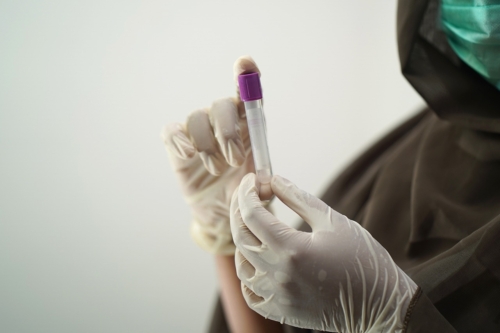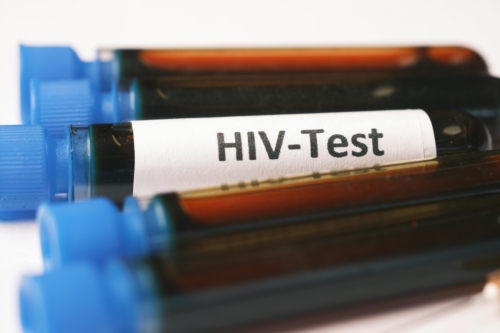Chattanooga man pleads guilty to knowingly giving his wife HIV
A Chattanooga man with a history of convictions pleaded guilty Wednesday morning to knowingly infecting his pregnant ex-wife with HIV in 2011. After four years of the case winding through Hamilton County Criminal Court, JH was sentenced to four years of supervised probation and zero contact with the victim. He was charged with criminal exposure to HIV.
“No visiting, calling or texting,” Judge Tom Greenholtz said. “Do you understand, Mr. H?”
H, 50, agreed. He waived his right to a jury trial, relinquished several of his civil rights — such as the ability to hold public office, vote or possess a firearm — and left the courtroom.
His former wife reported to Chattanooga police on June 6, 2011, that H knowingly gave her HIV, according to an affidavit. She and H met online in 2005 and married in November 2006, records show. The victim said she had sex only with H.
After getting lab work done, the victim learned she had the virus.
But when she shared her HIV-positive test results with H, he left, the affidavit says. H was arrested July 26, 2011, and later posted a $10,000 bond.
Court records show H also was arrested for criminal exposure to HIV in 1999, when he received a six-month jail sentence and was placed on probation for years when he infected someone else. Several other victims linked to H spoke out when his case was publicized in 2011.
In the courtroom Wednesday, H fidgeted near the back wall before he was called to the stand. In street clothes, he listened without reaction while Assistant District Attorney Kristen Spires rattled through the state’s evidence. He answered questions patiently. He didn’t hesitate when Greenholtz asked, “How do you plead?”
“Guilty,” he said.
More HIV victims speak out
On Wednesday, JH was arrested and charged with giving HIV to his pregnant wife.
On Friday, at least four other women with HIV were linked to him.
One died in 2005 when she was 28 years old, documents show. She was the mother of three children.
One tested negative for HIV, the virus that causes AIDS, on Friday after hearing the news of H’ arrest. She said she was grateful.
One was infected in 1992 and, with medication, says the virus is so scarce in her system now, it’s undetectable.
In 1997, one learned she was pregnant and HIV-positive in the same day. The woman, 41, takes medication and remains healthy, according to her family. But she pressed charges of criminal exposure to HIV against H. In 1999, he was sentenced to six months in jail and five years of probation.
But local HIV/AIDS experts say there are probably more women carrying the lingering effect of sex with H.
“It’s a domino effect. We’re going to have more people come in the door from this guy,” said Jerry Evans, assistant executive director of Chattanooga CARES, a local nonprofit that specializes in HIV and AIDS prevention,
People who test positive are told to disclose their status to sex partners, Evans said. “We’re very big talking about honesty and disclosure with partners.”
H didn’t, at least not all the time.
A few months ago, Hs’ 29-year-old pregnant wife went for lab work and learned she has the virus. She recently filed the charge of criminal exposure to HIV that landed him in Hamilton County Jail.
H, 46, could not be reached for comment on Friday and jail personnel declined to pass on an interview request. H declined an interview request earlier this week.
DJ is one of the lucky ones. Infected in 1992, she is living in Atlanta and doing well, with almost no trace of the virus still detectable in her body. But she still feels guilty for not doing a better job on getting the word out about H.
“He’s still hurting people,” she said. “That’s the hardest thing for me.
He needs to be stopped. That’s like someone putting a bullet in a gun and spinning it.”
And she feels especially bad for his new wife.
“I saw him and his wife last year,” she said. “I felt like, ‘I should tell her,’ but I didn’t. I thought he needs to do it. Even in seeing me, he couldn’t look at me. He dropped his head. And I just thought, ‘I just pray he’s doing the right thing.'”
J said H was with a thin woman with three children in tow. His wife has three children from a previous relationship.
“[His wife] looked over at me. They were happy and smiling,” J said. “It is so sad.”
The mother of the woman who charged H in 1999 said she wasn’t surprised when she heard the news that his wife had HIV and filed new charges against him. She remembers when he was first convicted.
“It was like he got a slap on the wrist,” the woman said. “What’s to stop him from doing it? They need to plaster his picture everywhere because people need to know. Somebody needs to tell them. There’s going to be plenty more, probably.”
According to the U.S. Centers for Disease Control and Prevention, someone is infected with HIV every 9 1/2 minutes. In Hamilton County, there are 1,425 people infected with HIV, according to 2009 statistics. About 100 people are infected each year in the Southeast Tennessee area, Evans said.
Evans said an HIV positive test result is not a death sentence any more.
“It’s all about letting them know, it’s not all over. You still have a life. This thing is more manageable than it’s ever been,” he said. “As long as you take your medication, 90 percent of our clients’ [viral counts] are undetectable. It doesn’t mean you don’t have HIV; it just means the viral load is tiny.
If convicted, H could receive a maximum sentence of six years in prison. According to Tennessee Bureau of Investigation, his only conviction in Tennessee is his prior HIV charge.
His next court date is set for Aug. 2 before General Sessions Court Judge David Bale.
J said she always disclosed her status to anyone she became intimate with.
“I tell my status before a handshake or a kiss,” said J, who is now married. “And you can accept me or not.”
And she doesn’t mind sharing her story because it helps others.
“This is me. This is what happened and this is what could happen to you,” she said. “This can take anybody’s life. It doesn’t discriminate. You can go out and do something one time. It goes far and beyond. It’s still happening.”
To those infected, J wants them to know there is life after testing positive.
“I’ve never been hospitalized,” J said. “I have an undetectable viral load. I feel wonderful.”
Chattanooga wife says husband gave her HIV
After a doctor called with the lab results, life would never be the same for a 29-year-old Chattanooga woman.
She learned her husband of nearly five years had given her HIV. He’d never even told her he had it, even though she’s pregnant with his child.
“That day changed my life forever,” she said. “Just because he didn’t pull the trigger doesn’t mean this is not a murder.”
Now JH, 46, is in Hamilton County Jail facing a charge of criminal exposure to HIV — the second time he has been arrested for the offense. In 1999, he received a six-month jail sentence and was placed on probation for five years when he infected someone else, according to court records.
“He was there when I found out I was pregnant. He was there when they drew the blood. He knew the secret was going to come out,” said the woman, who asked not to be named. “He moved out April 4; I found out April 6.”
When she confronted him about the pregnancy test results, he denied he was HIV positive and said he was going to be tested, she said.
The child growing inside her may be positive, too. Although she’s seven months pregnant, she said she doesn’t know.
Antiviral medication can be given to pregnant mothers to try to prevent spreading HIV to the fetus, according to the U.S. Centers for Disease Control and Prevention. A cesarean delivery also can be used to protect the infant, the CDC says.
H declined an interview request Thursday. He remains in jail on a $10,000 bond and his next court date is set for Aug. 2 in front of General Sessions Court Judge David Bales.
After finding out she was HIV positive, a friend told her stepfather that H was positive, too, and had a prior conviction for giving someone else HIV.
The couple met online in 2006 and married in 2007. At the time she met him, she was working two jobs to support her three children from a previous relationship.
“To marry me and go into a church in front of God with a pack of lies,” she said. “His father told me he had a wild lifestyle. I didn’t. Now I’m being punished. People are going to look at me differently all because somebody lied to me. I’ll never know why he did it. … This man lied to me the whole way through.”
Jerry Evans, assistant executive director of Chattanooga CARES, a local nonprofit organization that focuses on HIV/AIDS prevention and treatment, said it’s rare that people don’t disclose their HIV status. If H is not taking medication, the risk is higher to pass on the virus, Evans said.
H has never been treated by CARE, Evans said.
And Hs’ wife said that, during the five years they were together, he never took medication to treat HIV.
“Everyone who is HIV positive needs to be on HIV medicine,” Evans said.
Hs’ wife said he was hospitalized in 2008 for pneumonia, but doctors never told her that he was HIV positive.
“If they offered him treatment, he probably declined [treatment] to keep [his illness] a secret,” she said.
As of 2009, there were 1,425 HIV infected people in Hamilton County, Evans said, and about 100 more people in Southeast Tennessee test positive each year.
According to statistics from the U.S. Centers for Disease Control and Prevention, 21 percent of all HIV-infected people are unaware they are positive.
Hs’ wife said he was seeing other women before they separated.
“I know I’m helping other women to find out,” she said. “I knew he was cheating. They probably have not come forward.”
If convicted, Hs could be jailed from three to six years.
“I think six years is too lenient,” his wife said. “They say it’s not a death sentence now. Your health can always take a turn for the worst.”



